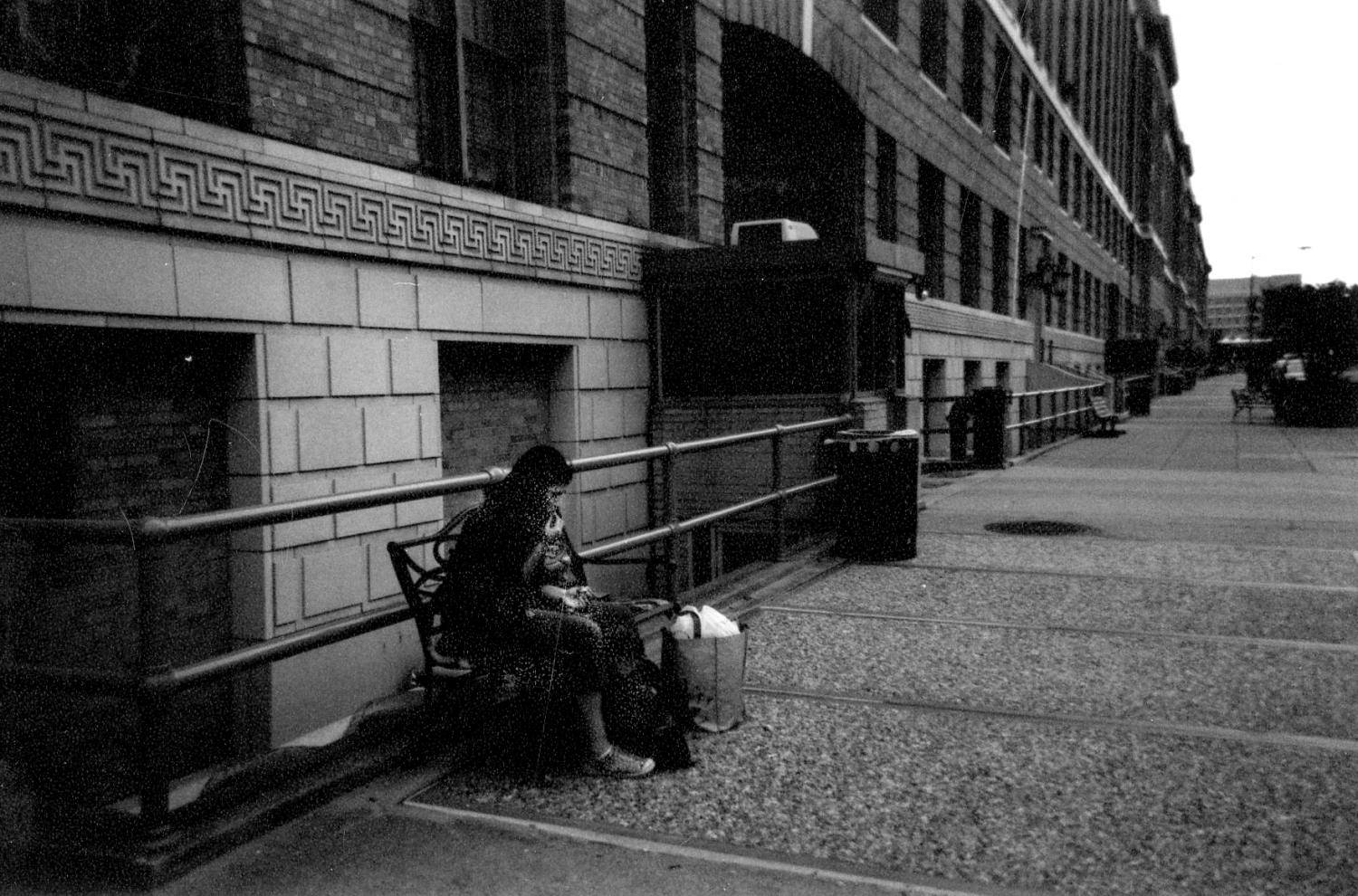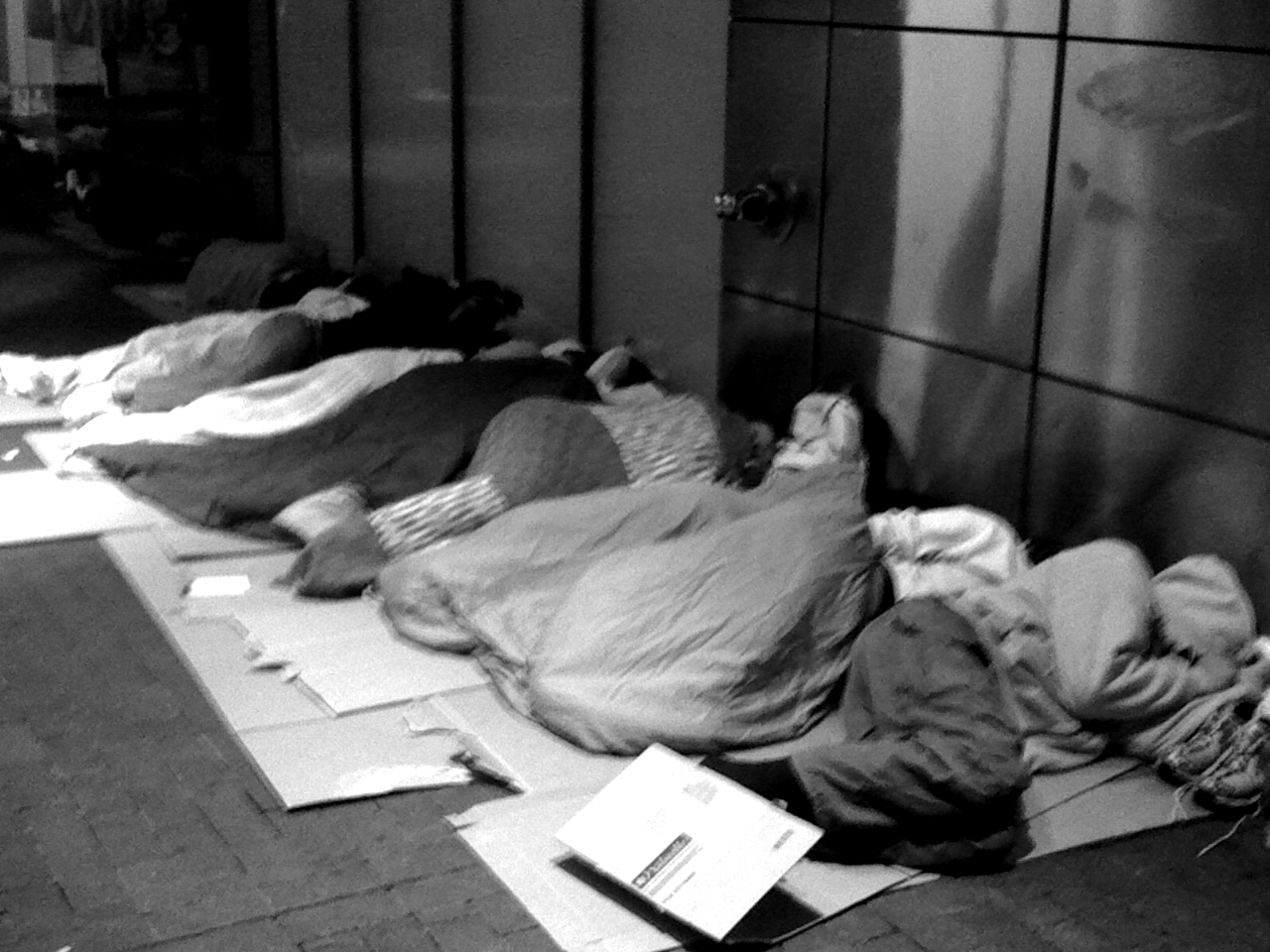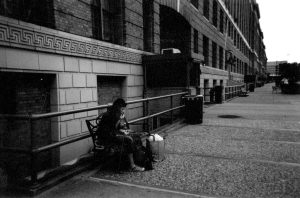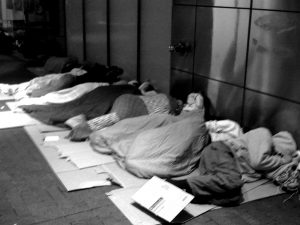Unhousing an Undergrad: AU Student Experiences Homelessness
There are a lot of things on my bucket list: skydiving, traveling, trying all 75 milkshake flavors at Z-Burger. And then there are a lot of things I never would have considered doing, like sleeping in an alley, learning dance steps from a complete stranger in a McDonald’s bathroom, begging for money on the side of the street.
But as a participant in the National Coalition for the Homeless’ Homeless Challenge Project, these experiences were more or less a requirement. So was sleeping outside and, most importantly, talking to others from those who spoke to empty spaces or the voices in their heads, to those suffering from addictions and their consequences, and those who were simply down on their luck. The objective of the HCP was “to see the world through the eyes of a homeless person.” And that’s what I and seven other participants set out to do.
I got some funny looks, lugging a battered, bulging black trash bag throughout Washington, DC. My appearance didn’t help, of course: grungy clothes not-quite-clean, hair greasy, and radiating an odor earned from four days without showering.
But most people were very careful to make sure they didn’t react, which didn’t really faze me at first.
After a while, I realized that the non-looks I was getting were different. Sometimes I would blatantly stare at the faces that passed me by and watch the transformation that would take place—first the eyes would fix on some obscure point far beyond my body, then the mouth and jaw would grow rigid, the neck swiveling neither left nor right, but instead keeping the whole head perfectly still, as if the slightest movement would be taken as acknowledgment.
It was when they thought I wasn’t looking that people would stare. At one point, I found a peaceful bench situated across from the Reflecting Pool and decided to take a nap.
After a solid 30 minutes, I met up with Becky, my partner for the day, who had been journaling on the grassy slope behind me. I listened, amazed, as she described the different reactions something as innocuous as sleeping on a bench had produced. Many adults would look at me askance, or literally stop and stare down at me, while children would point and ask questions. Many times I apparently stopped conversations all together as people hurried past.
Over the course of my 48 hours I would curl up in a doorway or some other nook or cranny, sometimes sleeping, sometimes watching. Oddly enough, I never really felt self-conscious, not even when I decided to nap on the Samuel Hahnemann Monument. My time on the Reflecting Pool bench taught me that I was just a part of the landscape to be observed and a piece of scenery interesting to some but not others.
It’s extremely difficult to tally the number of homeless in a given area. Totals are often underestimated because they are based on the number of people utilizing shelters. The National Coalition for the Homeless estimates that approximately 3.5 million people in the United States experience homelessness annually.
In the District of Columbia, that number is about 12,000, but for those under the age of 18 it’s around 500 people.
A young white face like mine isn’t really very common on the streets of DC, and is probably the only reason for the small $17.32 fortune I made that afternoon, which is now in my own small fund for giving back to those who actually need it. The fact that I wasn’t a middle-aged black man, that I wasn’t what people expected to see when they saw a homeless person, was enough to make them take notice.
People stereotype the homeless all the time. Maybe it’s impossible to prevent, but I’ve learned that we have to try, because the public misconception is so far from the truth.
Yes, from my limited personal experience I can say that, in DC, a large portion of the people you see on the streets are male. They are black. But there are also homeless white people and homeless women wandering around.
And then there are the homeless people who we don’t see as often: the children and the families. Even if we don’t see them, they’re there: on friends’ couches, in cars, in shelters, in cheap motels. Oftentimes the parents have part- or even full-time jobs, and the children go to school. In fact, there are about 1.6 million homeless children enrolled in the national school system right now. Approximately 1,000 of those are in DC alone.
You might ask how someone who works hard and isn’t battling any sort of alcohol or substance addiction can still be without a place to live. After all, this goes against the “American Dream.”
The answer is simple: lack of affordable housing, waiting lines that span decades for what little public housing there is, and low-income jobs in a struggling economy.
The answer to homelessness isn’t as simple as, “They all should go out and get a job!” While prowling around DuPont Circle a few weeks before participating in the HCP, I met a guy looking for exactly that.
When I met Eccrim Sherriff, he had been homeless for three months.
“Get a job. You know, that’s base one,” he told me. “Because if I could have a job I can pay for my own accommodation, and I can have food.”
Sherriff said he had been to job interviews before, but was unemployed because many employers don’t listen to candidates without permanent addresses or who come in looking less-than-presentable.
Organizations like Miriam’s Kitchen and Martha’s Table help the homeless by providing them with a meal and clean clothes, but employers often refuse to see past the stigma of living on the street or in a shelter.
“Being homeless doesn’t mean that you aren’t capable of doing things,” Sherriff said. He says he knows plenty of smart, capable homeless people.
“If you go down that side [of the street] you see that there are a load of talented people,” he said, pointing down the circle. “Someone well-educated who knows art. Someone who is a good public speaker. There’s such a combination of people, but because they’re homeless, they became confused, but being homeless doesn’t mean that you are useless.”
On Sunday, I went to the Church of the Epiphany for the early service.
Many at the church were homeless and lined up hours before the church even opened. The church restrooms were a far cry from the alley I’d peed in earlier that morning, and the pews provided a warm, safe space to sleep. Though a carport is quieter than the entrance to a metro station, the ground is just as hard.
While half the congregation napped, the rest of us split off into groups for activities. I joined the arts and crafts session. Others went to the Bible study group or the Narcotics Anonymous and Alcoholics Anonymous session.
At the session, I met Allan, a former physician. And, to be honest, I can’t really tell you very much of what he said. He used too many medical terms and big words ending in ‘ology’ for me to really follow what he was saying. The thing that struck me the most, however, wasn’t his obvious intelligence or his casual mention of a government conspiracy that cost him his job. It was the way that his thin, bespeckled face would light up, beaming with some kind of inner joy when he spoke of the things he used to do, and the complexities of his craft.
André Colter is a guide for HCP and helps those partaking in the experiment navigate being homeless. He himself has homeless on and off for 10 years. You wouldn’t know that by looking at him, though—the guy has enthusiasm for life, and his smile never seems to leave his face. A few years ago he decided go back to college, and now he’s in his third year of business administration. Recently, he walked his daughter down the aisle at her wedding, a memory he never thought he’d have the chance to make.
Colter says finding happiness has been a struggle for him due to anger issues, suicidal thoughts, trouble with money, alcohol and drugs.
“I refuse to go back,” he said. “Too many people have invested in me.” But his past is still always on his mind.
He stresses the importance of human contact in the life of a homeless person, and credits the basic kindness of others for helping him get on the right road.
“A smile and a word of kindness can literally save someone’s life,” Colter said.
He says many homeless people in the city are ignored by those passing them everyday, but says acknowledgment can go a long way.
While some people feel hesitant about that acknowledgement, he says it’s pretty simple: treat them as you would anyone else; ask about their day, their weekend. Ask directions somewhere. A homeless person who spends their days crisscrossing the city will probably be a lot more helpful than your iPhone.
My other HCP guide, Anthony Crawford, echoed what Colter told me.
“It doesn’t always take money,” he said. “Everybody has a story out there. Some are worse than others.” All that really matters, he said, is that someone out there is willing to listen and willing to care.
Photos by André Colter










